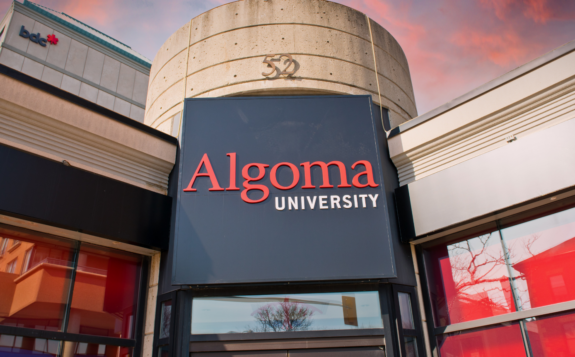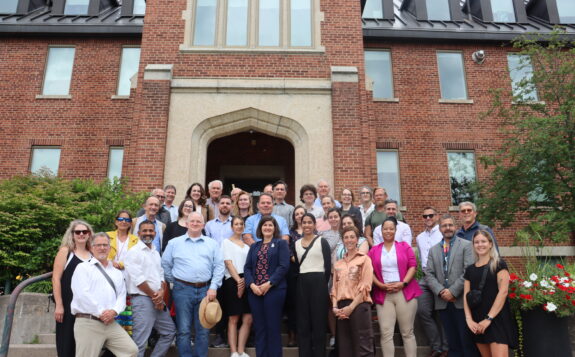(SAULT STE. MARIE, ON- July 27, 2022): As part of Algoma University’s ongoing commitment to implementing the Truth and Reconciliation Commission’s (TRC) Calls to Action, faculty at the institution have recently created the Faculty of Cross-Cultural Studies (FCCS). The guiding principles of the FCCS are based on sharing knowledge and creating spaces that acknowledge and include in education Indigenous worldviews from a global perspective. This distinct weaving of Indigenous and Western knowledge will create a welcoming teaching and learning environment for students from diverse social and cultural backgrounds. The FCCS is focused on honouring Chief Shingwauk’s vision and Algoma University’s Special Mission to cultivate cross-cultural learning between Indigenous communities and other communities.
The FCCS includes departments and faculty committed to decolonizing and Indigenizing teaching, learning and academia. The dedicated faculty leading the initiative have a history of actively engaging with decolonization and cross-cultural and intercultural education. Departments included within the FCCS include Sociology-Anthropology, Geography, Geology and Land Stewardship, and Community Economic and Social Development (CESD). The FCCS includes two research labs: Dr. Paulette Steeves’ Canada Research Chair; Indigenous History, Healing and Reconciliation Lab and the Dr. Robert Ewing Geography Lab and Aki Stewardship Centre.
The FCCS also counts on the CESD learning lab, originally designed within an Indigenous learning/education approach, CESD’s Community-based learning partnerships with Indigenous organizations and agencies, and multiple research projects led by individual faculty members involved in decolonizing community-based and equity, diversity and inclusion (EDI)-related methodological approaches. Social Sciences and Humanities Research Council (SSRHC) -funded research led by faculty in Sociology and CESD includes international projects involving Indigenous and Afrodiasporic communities, focussing on addressing the determinants of conflict and gendered violence, supporting territorial and political rights, Indigenous/Black perspectives on truth, reconciliation and reparations, and approaches to decolonization. Numerous faculty in the FCCS are also very involved with the work to expand and continue the People’s Garden and planning for a food forest and new garden area on Algoma’s Sault Ste. Marie campus as part of the SSHRC Partnership Development Grant funded Lake Superior Living Labs Network.
“Within the Faculty, Indigenization, equity, diversity and inclusion (I-EDI) are integrated across all their academic pursuits and aligned with institutional commitments,” shared Michele Piercy-Normore, Vice-President Academic and Research. “The FCCS is poised to provide a unique, academic space for collaborative programming, teaching, learning, and engagement internal and external to the University that is open to all faculties and programs across the University interested in carrying out this work with the new Faculty.”
After two years of discussions and engagement with all faculty and staff, led by Dr. Steeves, the FCCS received approval at the April 2022 meeting of the Algoma University Senate.
The FCCS seeks to:
Support interdisciplinary and multi-epistemological pedagogies.
Foster and enhance global Indigenous and cross-cultural teaching and learning.
Decolonize and Indigenize teaching, learning and research.
Respond to the TRC Calls to Action, decolonization and EDI with a strategic focus on curricula, policies, research, cross-cultural teaching and learning, community partnerships, and governance.
“The guiding principles of the FCCS are based on sharing knowledge to weave the diversity of Indigenous knowledge into curriculum, reinforcing the significant work being done at Algoma University in support of our broader Special Mission of inclusion of traditional and contemporary ways of “sharing, healing and learning,” shared Mary Wabano-McKay, Vice-President Nyaagaaniid, Anishinaabe Initiatives, Equity and Student Success. “The FCCS will open up spaces where all can learn with and from one another while acknowledging the contributions of diverse worldviews – making the world a better place.”
Further information on the new Faculty of Cross-Cultural Studies is available on the Algoma University website.
Share Article




